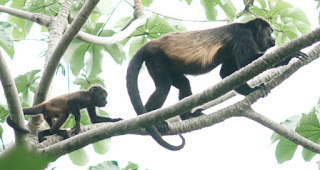 |
| What planet are we leaving for them? |
Nicaragua is self-described for decades as the country "where lead floats and cork sinks". The country has steadfastly defied the conventional wisdom generated, promoted and supported by the rest of the world. Whether on the national, political level, or in the barrio, Nicaraguan thought has tended to take turns that did not always come from the playbook provided.
Recent world events have once again brought the country into the forefront of the news. Nicaragua shares the dubious honor of accompanying two other nations that are not united in the recent Paris accords regarding climate change. The accords were uncharacteristically broad and bland that virtually every nation signed on, even the stubborn government of North Korea. Syria, distracted by a bloodbath within its borders, did not sign, nor did it protest. The nation which aspires and daily claims to be the greatest nation on the planet, the United States of America, signed, but its new leader, Donald Trump, declared the agreement to be inequitable toward the USA. His opposition to the agreement and intention to depart from it was declared recently.
It has been said that politics makes strange bedfellows. With the dismaying declarations of the President of the United States, Nicaragua is strangely united into a unique club of those outside the Paris accord, this space with a failed nation and a tragically misguided empire.
All this is important to note, because of the gravity of climate change on human life and wild nature globally. Paleontologists have declared the current times a new geological epoch, in which the human influence on the climate becomes indelible. The effect of modern society, in these terms, on temperatures, atmospheric composition, and weather processes, has become paramount. Among the few decision-makers who dare to question that humans are provoking long-term impacts on the climate which threaten even the survivability of our own species on this planet, are only those who are in position to benefit directly from its negation, such as the new head of the Environmental Protection Agency.
An anthropological analysis of the government of the USA and the sides of the debate regarding climate change belies the self-interest of individuals who gain from pretending that the obvious is happening. In contrast, the government of Nicaragua has taken a posture which can be criticized and discussed, but its relevance to history is indisputable. Climate change is real, it affects the quality of life of humans, and the distribution of impacts among humans is unequal. Poor people, worldwide, bear the brunt of the negative effects of climate change. Unlike the USA, the government of Nicaragua has not sought to negate the relation between human activities and the environment, but rather to accentuate that poor nations are victims of a kind of climate-imperialism imposed by the richer nations, especially those set in the temperate zones of the northern hemisphere.
As Gaia director Jeffrey McCrary, states in a recent essay published in El Nuevo Diario, the posture of Nicaragua regarding the accords sets the country far apart from that of the USA. The government of Nicaragua has made deep commitments toward the environment, particularly regarding greenhouse gas emissions, whereas the government of the USA is backpedaling. We need urgently to establish what climate change will mean to Nicaragua, in terms of shorelines, ecosystems, habitats for fauna in both the land and in the waters of the country, the impacts on populations regarding agriculture, vulnerability to storms and drought, livability regarding temperatures.... so many things!
Monkey die-offs, water wells going dry, lake levels dropping, crop failures, floods, hurricanes that flatten areas. The rapid advance of the agricultural frontier. Median temperature rise. What more evidence do we need?
 |
| Click on the 'escudo' to contact us at GAIA. |
No comments:
Post a Comment